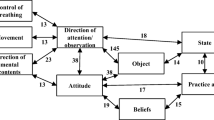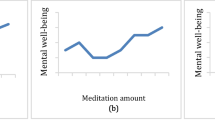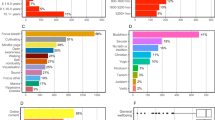Abstract
Meditation has become a cultural phenomenon, and modern scientific research on the topic has exploded. Thousands of scientific articles report various benefits of meditation including clinical, physiological and well-being outcomes. Despite these benefits, drop-out rates in mindfulness-based interventions remain a problem and little work has studied the drawbacks of meditation. Reports of adverse reactions to meditation have emerged and critical voices have begun advocating caution, rather than enthusiasm, for meditation training. Furthermore, the experiences of meditators outside interventions and conventional lab studies are not well understood. Here we develop an empirical codebook of and framework for meditation benefits and drawbacks (MBDs), discussing the actionable implications for meditation training in the real world. These data reveal the major drawbacks hindering real-world meditators, including several less intuitive drawbacks. We also report the major benefits of meditation and generate a structural framework from which they can be understood in parallel with drawbacks. We investigate whether meditation styles affect MBDs and report comparisons between current and former meditators. These results bring cogent structure to the variety of meditation outcomes laypeople experience. As the number of meditators continues to increase, we need such structures to inform how meditation is taught, ensuring ethically informed consent and optimizing practice-fit. Mixed-methods research such as this study allows a greater practical understanding of how meditation is experienced in situ. This work complements the literature on the clinical benefits and neurophysiological mechanisms of meditation and this framework will inform clinicians, researchers and meditation teachers as best practices are reviewed in the coming years.

Similar content being viewed by others
References
Anderson, T. (2017). Reddit user ‘oredna’, Thomas Anderson, PhD student. Retrieved 10 September 2018, from https://www.reddit.com/user/oredna/
Anderson, T., & Farb, N. A. S. (2018). Personalising practice using preferences for meditation anchor modality. Frontiers in Psychology, 9. https://doi.org/10.3389/fpsyg.2018.02521.
Anderson, T., Suresh, M., & Farb, N. (2016). Meditation benefits and drawbacks: empirical codebook and implications for teaching. Retrieved 8 September 2018, from https://osf.io/b2hxu/
Brown, K. W., Ryan, R. M., & Creswell, J. D. (2007). Mindfulness: theoretical foundations and evidence for its salutary effects. Psychological Inquiry, 18(4), 211–237. https://doi.org/10.1080/10478400701598298.
Carver, C. S., & White, T. L. (1994). Behavioral inhibition, behavioral activation, and affective responses to impending reward and punishment: the BIS/BAS scales. Journal of Personality and Social Psychology, 67, 319–333.
Castillo, R. J. (1990). Depersonalization and meditation. Psychiatry, 53(2), 158–168.
Cebolla, A., Demarzo, M., Martins, P., Soler, J., & Garcia-Campayo, J. (2017). Unwanted effects: is there a negative side of meditation? A multicentre survey. PLoS One, 12(9), e0183137. https://doi.org/10.1371/journal.pone.0183137.
Compson, J. (2018). Adverse meditation experiences: navigating Buddhist and secular frameworks for addressing them. Mindfulness, 9(5), 1358–1369. https://doi.org/10.1007/s12671-017-0878-8.
Corbin, J. M. (2017). Grounded theory. The Journal of Positive Psychology, 12(3), 301–302. https://doi.org/10.1080/17439760.2016.1262614.
Corbin, J. M., & Strauss, A. (1990). Grounded theory research: procedures, canons, and evaluative criteria. Qualitative Sociology, 13(1), 3–21. https://doi.org/10.1007/BF00988593.
Couper, M. (2002). Safety of medicines—a guide to detecting and reporting adverse drug reactions—why health professionals need to take action. Retrieved 23 January 2018, from http://apps.who.int/medicinedocs/en/d/Jh2992e/2.html
Crane, C., & Williams, J. M. G. (2010). Factors associated with attrition from mindfulness-based cognitive therapy in patients with a history of suicidal depression. Mindfulness, 1(1), 10–20 https://doi.org/10.1007/s12671-010-0003-8.
Crescentini, C., Fabbro, F., & Tomasino, B. (2017). Editorial special topic: enhancing brain and cognition through meditation. Journal of Cognitive Enhancement, 1(2), 81–83. https://doi.org/10.1007/s41465-017-0033-4.
Davidson, R. J., & Kaszniak, A. W. (2015). Conceptual and methodological issues in research on mindfulness and meditation. American Psychologist, 70(7), 581–592.
Dobkin, P. L., Irving, J. A., & Amar, S. (2012). For whom may participation in a mindfulness-based stress reduction program be contraindicated? Mindfulness, 3(1), 44–50. https://doi.org/10.1007/s12671-011-0079-9.
Dresler, M., Sandberg, A., Ohla, K., Bublitz, C., Trenado, C., Mroczko-Wąsowicz, A., et al. (2013). Non-pharmacological cognitive enhancement. Neuropharmacology, 64, 529–543. https://doi.org/10.1016/j.neuropharm.2012.07.002.
Eberth, J., & Sedlmeier, P. (2012). The effects of mindfulness meditation: a meta-analysis. Mindfulness, 3(3), 174–189. https://doi.org/10.1007/s12671-012-0101-x.
Elliot, A. J., & Church, M. A. (1997). A hierarchical model of approach and avoidance achievement motivation. Journal of Personality and Social Psychology, 72(1), 218–232. https://doi.org/10.1037/0022-3514.72.1.218.
Farb, N., Anderson, T., & Segal, Z. V. (2018). Contemplative practice, well being, and social function. Retrieved 18 June 2018, from https://osf.io/w2f86/
Farias, M., & Wikholm, C. (2016). Has the science of mindfulness lost its mind? BJPsych Bulletin, 40(6), 329–332. https://doi.org/10.1192/pb.bp.116.053686.
Farias, M., Wikholm, C., & Delmonte, R. (2016). What is mindfulness-based therapy good for? The Lancet Psychiatry, 3(11), 1012–1013. https://doi.org/10.1016/S2215-0366(16)30211-5.
Fenwick, P. (1983). Can we still recommend meditation? British Medical Journal (Clinical Research Ed.), 287(6403), 1401.
Fortier, M. S., Hogg, W., O’Sullivan, T. L., Blanchard, C., Reid, R. D., Sigal, R. J., et al. (2007). The physical activity counselling (PAC) randomized controlled trial: rationale, methods, and interventions. Applied Physiology, Nutrition, and Metabolism = Physiologie Appliquee, Nutrition Et Metabolisme, 32(6), 1170–1185. https://doi.org/10.1139/H07-075.
Gosling, S. D., Rentfrow, P. J., & Swann, W. B. (2003). A very brief measure of the big-five personality domains. Journal of Research in Personality, 37(6), 504–528. https://doi.org/10.1016/S0092-6566(03)00046-1.
Goyal, M., Singh, S., Sibinga, E. M. S., Gould, N. F., Rowland-Seymour, A., Sharma, R., et al. (2014). Meditation programs for psychological stress and well-being: a systematic review and meta-analysis. JAMA Internal Medicine, 174(3), 357–368. https://doi.org/10.1001/jamainternmed.2013.13018.
Grossman, P., Niemann, L., Schmidt, S., & Walach, H. (2004). Mindfulness-based stress reduction and health benefits: a meta-analysis. Journal of Psychosomatic Research, 57(1), 35–43. https://doi.org/10.1016/S0022-3999(03)00573-7.
Jensen, C. G., Vangkilde, S., Frokjaer, V., & Hasselbalch, S. G. (2012). Mindfulness training affects attention—or is it attentional effort? Journal of Experimental Psychology: General, 141(1), 106–123. https://doi.org/10.1037/a0024931.
Jha, A. P., Krompinger, J., & Baime, M. J. (2007). Mindfulness training modifies subsystems of attention. Cognitive, Affective, & Behavioral Neuroscience, 7(2), 109–119.
Josipovic, Z., & Baars, B. J. (2015). Editorial: what can neuroscience learn from contemplative practices? Frontiers in Psychology, 6. https://doi.org/10.3389/fpsyg.2015.01731.
Kabat-Zinn, J. (2013). Full catastrophe living, Revised Edition: How to cope with stress, pain and illness using mindfulness meditation. Little, Brown Book Group.
Khoury, B., Lecomte, T., Fortin, G., Masse, M., Therien, P., Bouchard, V., et al. (2013). Mindfulness-based therapy: a comprehensive meta-analysis. Clinical Psychology Review, 33(6), 763–771. https://doi.org/10.1016/j.cpr.2013.05.005.
Kuijpers, H. J. H., van der Heijden, F. M. M. A., Tuinier, S., & Verhoeven, W. M. A. (2007). Meditation-induced psychosis. Psychopathology, 40(6), 461–464. https://doi.org/10.1159/000108125.
Lindahl, J. R., Fisher, N. E., Cooper, D. J., Rosen, R. K., & Britton, W. B. (2017). The varieties of contemplative experience: a mixed-methods study of meditation-related challenges in Western Buddhists. PLoS One, 12(5), e0176239. https://doi.org/10.1371/journal.pone.0176239.
Lustyk, M. K. B., Chawla, N., Nolan, R. S., & Marlatt, G. A. (2009). Mindfulness meditation research: issues of participant screening, safety procedures, and researcher training. Advances in Mind-Body Medicine, 24(1), 20–30.
Matejka, J., Glueck, M., Grossman, T., & Fitzmaurice, G. (2016). The effect of visual appearance on the performance of continuous sliders and visual analogue scales. In Proceedings of the 2016 CHI Conference on Human Factors in Computing Systems (pp. 5421–5432). New York: ACM. https://doi.org/10.1145/2858036.2858063
Mesmer-Magnus, J., Manapragada, A., Viswesvaran, C., & Allen, J. W. (2017). Trait mindfulness at work: a meta-analysis of the personal and professional correlates of trait mindfulness. Human Performance, 0(0), 1–20. https://doi.org/10.1080/08959285.2017.1307842.
Mrazek, M. D., Franklin, M. S., Phillips, D. T., Baird, B., & Schooler, J. W. (2013). Mindfulness training improves working memory capacity and GRE performance while reducing mind wandering. Psychological Science, 24(5), 776–781. https://doi.org/10.1177/0956797612459659.
Ng, B. Y. (1999). Qigong-induced mental disorders: a review. The Australian and New Zealand Journal of Psychiatry, 33(2), 197–206. https://doi.org/10.1046/j.1440-1614.1999.00536.x.
NRS. (2018). Social Grade | National Readership Survey. Retrieved 9 September 2018, from http://www.nrs.co.uk/nrs-print/lifestyle-and-classification-data/social-grade/
Peer, E., Brandimarte, L., Samat, S., & Acquisti, A. (2017). Beyond the Turk: alternative platforms for crowdsourcing behavioral research. Journal of Experimental Social Psychology, 70, 153–163. https://doi.org/10.1016/j.jesp.2017.01.006.
Ryan, R. M., & Deci, E. L. (2000). Self-determination theory and the facilitation of intrinsic motivation, social development, and well-being. The American Psychologist, 55(1), 68–78.
Sattelberg, W. (2018). The demographics of Reddit: who uses the site? Retrieved 22 August 2018, from https://www.techjunkie.com/demographics-reddit/
Shapiro, D. H. (1992). Adverse effects of meditation: a preliminary investigation of long-term meditators. International Journal of Psychosomatics: Official Publication of the International Psychosomatics Institute, 39(1–4), 62–67.
Smallwood, J., & Schooler, J. (2006). The restless mind. Psychological Bulletin, 132(6), 946–958. https://doi.org/10.1037/0033-2909.132.6.946.
Stol, K., Ralph, D. P., & FitzGerald, B. (2016). Grounded theory in software engineering research: a critical review and guidelines. https://doi.org/10.1145/2884781.2884833
Stürmer, S., Snyder, M., & Omoto, A. M. (2005). Prosocial emotions and helping: the moderating role of group membership. Journal of Personality and Social Psychology, 88(3), 532–546. https://doi.org/10.1037/0022-3514.88.3.532.
Tanaka, K. K. (2007). The individual in relation to the Sangha in American Buddhism: an examination of ‘“privatized religion”’. Buddhist-Christian Studies, 27(1), 115–127. https://doi.org/10.1353/bcs.2007.0028.
Tang, Y.-Y., Ma, Y., Wang, J., Fan, Y., Feng, S., Lu, Q., et al. (2007). Short-term meditation training improves attention and self-regulation. Proceedings of the National Academy of Sciences of the United States of America, 104(43), 17152–17156. https://doi.org/10.1073/pnas.0707678104.
Van Dam, N. T., van Vugt, M. K., Vago, D. R., Schmalzl, L., Saron, C. D., Olendzki, A., et al. (2018). Mind the hype: a critical evaluation and prescriptive agenda for research on mindfulness and meditation. Perspectives on Psychological Science: A Journal of the Association for Psychological Science, 13(1), 36–61. https://doi.org/10.1177/1745691617709589.
West, M. (1979). Meditation. The British Journal of Psychiatry, 135(5), 457–467. https://doi.org/10.1192/bjp.135.5.457.
Wong, S. Y. S., Chan, J. Y. C., Zhang, D., Lee, E. K. P., & Tsoi, K. K. F. (2018). The safety of mindfulness-based interventions: a systematic review of randomized controlled trials. Mindfulness, 9(5), 1344–1357. https://doi.org/10.1007/s12671-018-0897-0.
Zeidan, F., Johnson, S. K., Diamond, B. J., David, Z., & Goolkasian, P. (2010). Mindfulness meditation improves cognition: evidence of brief mental training. Consciousness and Cognition, 19(2), 597–605. https://doi.org/10.1016/j.concog.2010.03.014.
Author information
Authors and Affiliations
Corresponding author
Ethics declarations
All research was conducted under informed consent in accord with the Declaration of Helsinki. Participated volunteered their responses without financial compensation.
Conflict of Interest
The authors declare that there is no conflict of interest.
Additional information
Publisher’s Note
Springer Nature remains neutral with regard to jurisdictional claims in published maps and institutional affiliations.
Rights and permissions
About this article
Cite this article
Anderson, T., Suresh, M. & Farb, N.A. Meditation Benefits and Drawbacks: Empirical Codebook and Implications for Teaching. J Cogn Enhanc 3, 207–220 (2019). https://doi.org/10.1007/s41465-018-00119-y
Received:
Accepted:
Published:
Issue Date:
DOI: https://doi.org/10.1007/s41465-018-00119-y




